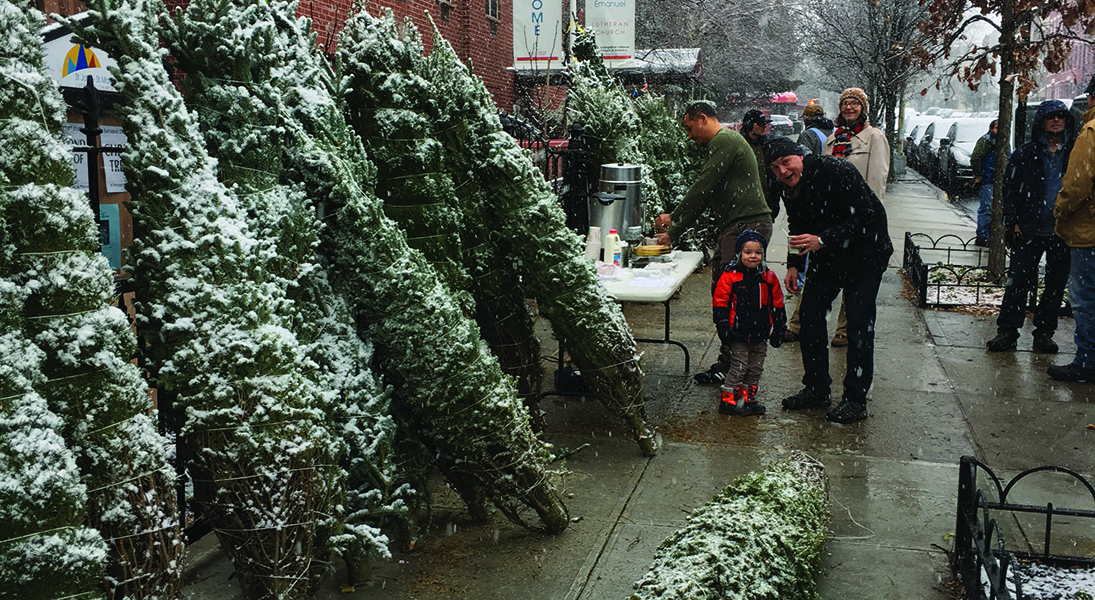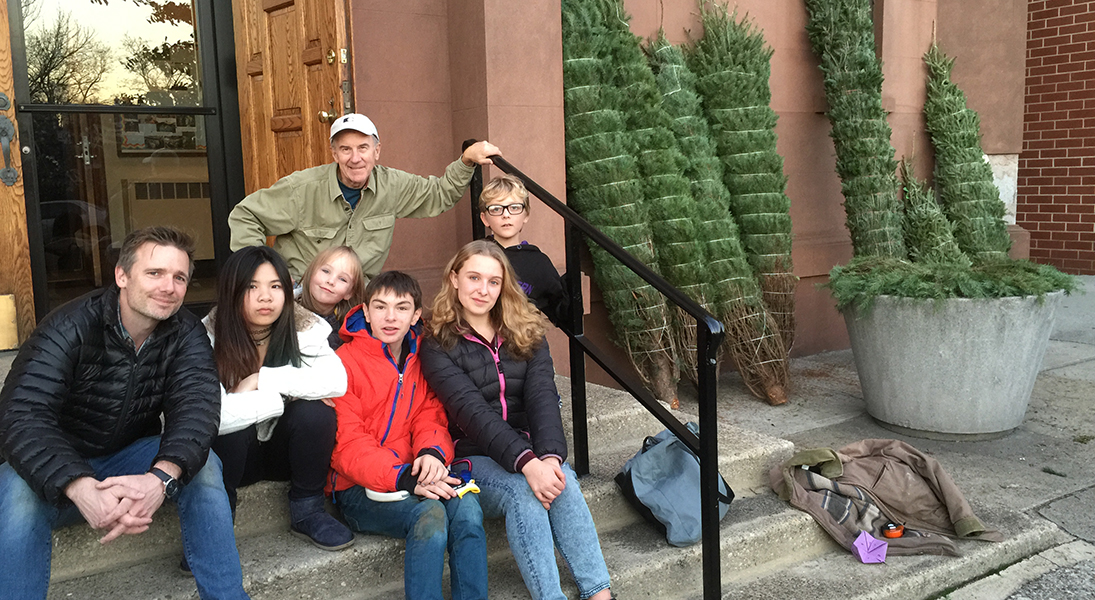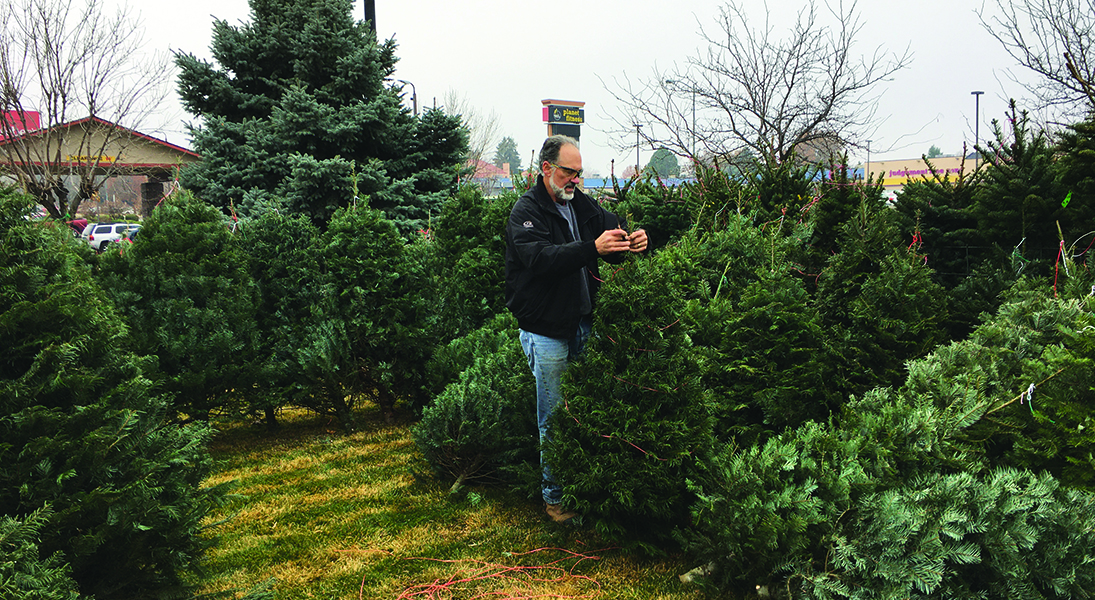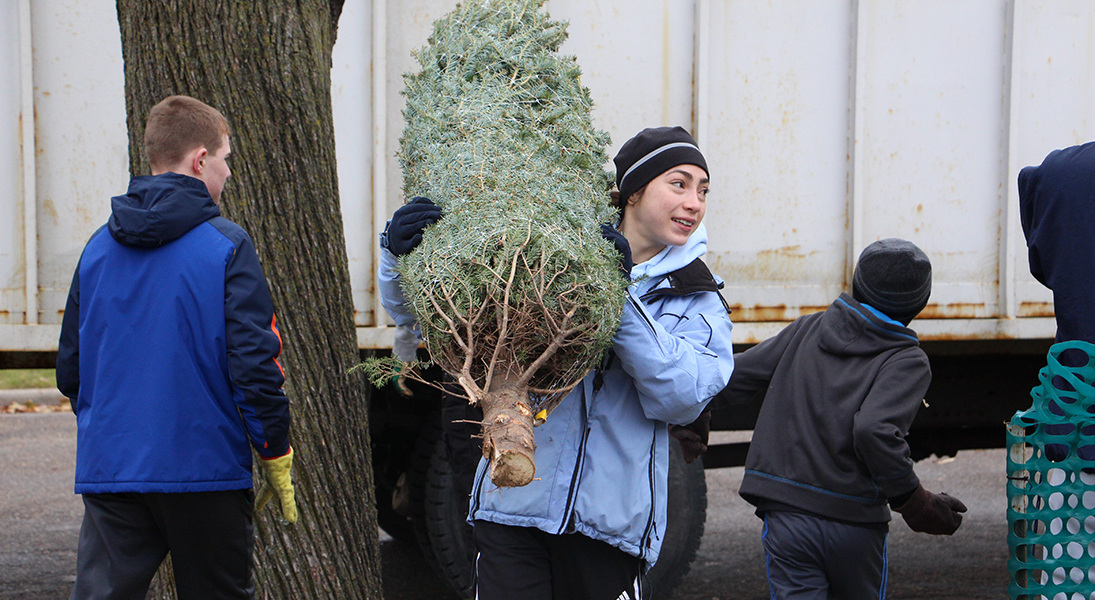Gary Heard’s previous congregation, Advent Lutheran in Manhattan, decided to try selling Christmas trees in the mid-1990s as a fundraiser to bolster the church budget.
“We were struggling at the time as a congregation; the number of people had dwindled,” he said. “We did all sorts of things to try to raise money, like clothing sales and those types of things. In Manhattan in November and December, there are countless trees being sold out on the street, and we thought that would be a perfect way for us to raise some money.”
Through a connection in the congregation, Advent arranged to have a load of trees brought in from Pennsylvania. The congregation decided to dedicate half the money it made to a charity and the other half to its budget.
The sale was a hit, and the congregation made it an annual event for many years.
“It became just a great church fellowship event and, importantly, it was an event for the community surrounding Advent,” Heard said.
About 12 years ago Heard started attending St. JME Lutheran (St. John–St. Matthew–Emanuel) in Brooklyn, and he soon presented the congregation with the idea of selling Christmas trees. “While we didn’t have any real financial problems, I thought it would be a perfect way for us to raise some funds for charity,” he said. “And I’ve had the very same experience of people in the community looking forward to the one-day sale and coming year after year to buy their trees.
“It puts faces to the building. Very often a church just sits in the community and is open a couple times a week, and otherwise people don’t take much notice. But when you have a big one-day Christmas sale, with lots of people walking about the church and walking by, especially in a place like Brooklyn or Manhattan, the church gets noticed and people get noticed.”
David Parsons, pastor of St. JME, said the event presents an evangelism moment—someone new becomes involved in the church each year as a result of the tree sale.
At press time the congregation was still deciding whether it would host its tree sale this year because of the COVID-19 pandemic, but the annual event is usually a bit of a Christmas sidewalk fair, Heard said. Hot chocolate and cookies are sold outside with the trees, and a craft fair takes place inside the church.
The congregation usually sells around 70 trees, making about $2,000 for a charity they choose each year. Often, people will overpay for their trees, saying they appreciate that the proceeds go to a good cause.
Parsons said a wonderful part of the sale, which involves members of all ages, is the community-building within the congregation. “[It gets] busy New Yorkers, Brooklynites, who have long commutes into the city, and brings them together to do ministry for the sake of their neighbors,” he said.
Season of giving
In a similar spirit of service, Lord of Life Lutheran Church in Kennewick, Wash., has been selling Christmas trees and wreaths since 2004 as a fundraiser to help pay for its annual intergenerational mission trips. About 220 trees are picked up every year from a supplier in Oregon, and the congregation opens the tree lot on church grounds the Saturday after Thanksgiving.
“It requires the entire congregation to make it happen,” said Heidi Cryer, deacon at Lord of Life. “We’re basically selling for three weeks and are open every day of the week.”
Volunteers from the congregation sign up for two-hour shifts to sell trees in the evenings and on weekends; staff members sell trees during the day.
“Most of the customers are repeat and have been coming back for years,” Cryer said. “We have people who are hugely generous. They could go to a place like Home Depot and get a less-expensive tree, but they’re willing to pay more because they know the money is going to a good cause. Every year they ask us where we’re going [on the mission trip] this year.”
With every tree purchase from Lord of Life, customers receive a folded star ornament that a member makes from old bulletins. Cryer described these as a fun item that customers look forward to getting.
“It puts faces to the building. Very often a church just sits in the community and is open a couple times a week, and otherwise people don’t take much notice.”
Lord of Life has made an annual tradition of tithing 20 to 25 trees to families that might not be able to afford one otherwise. For the last several years, these trees have been given to families served by Lutheran Community Services Northwest in Kennewick.
The congregation tithes a portion of the money it spends to take mission trips. Cryer thinks they decided to start tithing trees because of this connection and the thought that tithing should start “from the get-go” of mission projects. “The tree lot has become an understanding of who we are within and how the community knows us as selling trees,” she said.
Because of the pandemic, Lord of Life won’t open its Christmas tree lot this year, but Cryer said the congregation ordered 25 trees from another local church’s sale so they can still donate trees to Lutheran Community Services Northwest.
Christmas connections
In Lake Mills, Wis., Trinity Lutheran Church has also rooted itself in the community’s holiday traditions with its annual Christmas tree sale. “It started in immediate need for new carpet and appliances in the kitchen, and this was way back when the church was struggling to meet ends financially—certainly 20 years ago or so,” said member Todd Larson.
Now a fundraiser for a food pantry, the sale has changed quite a bit over the years and is an anticipated family activity for parishioners. Every year they get together the weekend after Thanksgiving to unload a delivery of trees, which usually number around 250.
Though Trinity operates the only fresh-cut Christmas tree sale in town, it has two lots. A downtown location is run by congregation volunteers; the site at Watson Ace Hardware is managed by store staff.
“When they built Ace Hardware, they have an outdoor garden center, and it was clear that it would be an ideal space to sell Christmas trees,” said Mark Dressel, pastor of Trinity. “We wanted to act in cooperation rather than competition with them, so we talked with the owner and said, ‘We’re a church that sells trees for the food pantry. Would you like to join us?’”
“So now there are two opportunities for someone who needs to buy trees,” Larson said. “We greatly appreciate what they do for us.”
This year, in accordance with pandemic precautions, Trinity has set up an online ordering system and members will home-deliver each tree.
Like St. JME and Lord of Life, Trinity has customers who want to pay extra for their trees so they can increase the donation to the food pantry. “People are very generous,” Dressel said.









